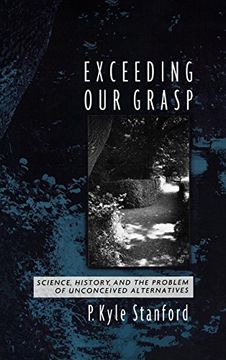Compartir
Exceeding our Grasp: Science, History, and the Problem of Unconceived Alternatives (en Inglés)
P. Kyle Stanford (Autor)
·
Oxford University Press
· Tapa Dura
Exceeding our Grasp: Science, History, and the Problem of Unconceived Alternatives (en Inglés) - P. Kyle Stanford
$ 115.00
$ 156.07
Ahorras: $ 41.07
Elige la lista en la que quieres agregar tu producto o crea una nueva lista
✓ Producto agregado correctamente a la lista de deseos.
Ir a Mis ListasSe enviará desde nuestra bodega entre el
Jueves 16 de Mayo y el
Viernes 17 de Mayo.
Lo recibirás en cualquier lugar de Estados Unidos entre 1 y 3 días hábiles luego del envío.
Reseña del libro "Exceeding our Grasp: Science, History, and the Problem of Unconceived Alternatives (en Inglés)"
The incredible achievements of modern scientific theories lead most of us to embrace scientific realism: the view that our best theories offer us at least roughly accurate descriptions of otherwise inaccessible parts of the world like genes, atoms, and the big bang. In Exceeding Our Grasp, Stanford argues that careful attention to the history of scientific investigation invites a challenge to this view that is not well represented in contemporary debates about the nature of the scientific enterprise. The historical record of scientific inquiry, Stanford suggests, is characterized by what he calls the problem of unconceived alternatives. Past scientists have routinely failed even to conceive of alternatives to their own theories and lines of theoretical investigation, alternatives that were both well-confirmed by the evidence available at the time and sufficiently serious as to be ultimately accepted by later scientific communities. Stanford supports this claim with a detailed investigation of the mid-to-late 19th century theories of inheritance and generation proposed in turn by Charles Darwin, Francis Galton, and August Weismann. He goes on to argue that this historical pattern strongly suggests that there are equally well-confirmed and scientifically serious alternatives to our own best theories that remain currently unconceived. Moreover, this challenge is more serious than those rooted in either the so-called pessimistic induction or the underdetermination of theories by evidence, in part because existing realist responses to these latter challenges offer no relief from the problem of unconceived alternatives itself. Stanford concludes by investigating what positive account of the spectacularly successful edifice of modern theoretical science remains open to us if we accept that our best scientific theories are powerful conceptual tools for accomplishing our practical goals, but abandon the view that the descriptions of the world around us that they offer are therefore even probably or approximately true.
- 0% (0)
- 0% (0)
- 0% (0)
- 0% (0)
- 0% (0)
Todos los libros de nuestro catálogo son Originales.
El libro está escrito en Inglés.
La encuadernación de esta edición es Tapa Dura.
✓ Producto agregado correctamente al carro, Ir a Pagar.

